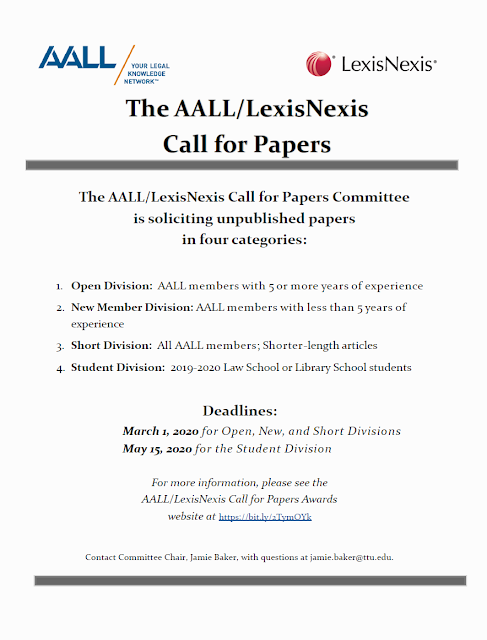AALL's Principles & Standards for Legal Research Competency
Yesterday, I was reminded of AALL's Principles & Standards for Legal Research Competency. These standards are a valuable tool to help focus legal research instruction and evaluate information literacy.
From the website:
"The American Association of Law Libraries (AALL) has developed a set of principles and standards for legal research competency, drawn from information professionals' deep involvement in legal research within academe, law firms, the courts, government agencies, and other related settings, as well as the literature of the legal profession indicating that research competency directly impacts professional efficiency and effectiveness."
The principles advanced by the American Association of Law Libraries are:
- A successful legal researcher possesses foundational knowledge of the legal system and legal information sources.
- A successful legal researcher gathers information through effective and efficient research strategies.
- A successful legal researcher critically evaluates information.
- A successful legal researcher applies information effectively to resolve a specific issue or need.
- A successful legal researcher distinguishes between ethical and unethical uses of information, and understands the legal issues associated with the discovery, use, or application of information.
The wonderful thing about these principles is that each one is linked to a set of standards and competencies that the successful researcher will understand and incorporate into his or her own legal research techniques.
For example, Principle I has four standards and several competencies for each standard:
Principle I: A successful legal researcher possesses foundational knowledge of the legal system and legal information sources.
Standards:
A. An information-literate legal professional considers the full range of potential sources of
information, regardless of type or format.
Competencies:
1. Differentiates between primary and secondary sources, and recognizes how their use
and importance vary depending upon the legal problem or issue.
2. Identifies and uses the most effective secondary sources to obtain background
information, to gain familiarity with terms of art, and to put primary sources in context.
3. Recognizes differences in the weight of authority among sources and applies that
knowledge to the legal research problem.
With four major principles, each with several standards and many competencies, it is easy to see how useful these are to focus curriculum and evaluate if students are actually information literate. Thank you AALL for creating this wonderful resource!


Comments
Post a Comment